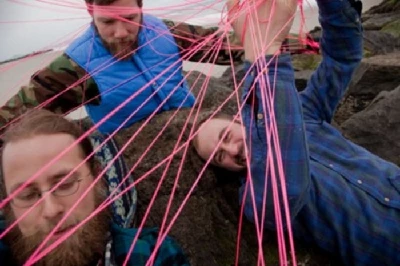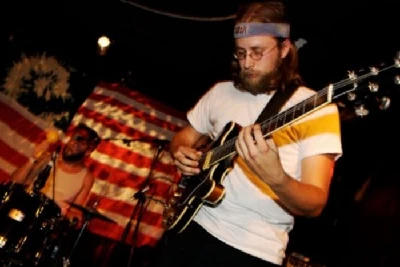published: 22 /
5 /
2009

New York-based experimental folk act Akron Family have recently seen the departure of a founding member and also left their label, Young God. Multi-instrumentalist Seth Olinsky speaks to Sarah Johnson about these changes, which are reflected on the band's new 'Set ‘Em Wild, Set ‘Em Free' album
Article
Sitting at the edge of St James Park in London it’s easy to get a feel for the city. Black cabs roll past, police patrol the area with the Queens Palace visible over the trees and people are littered across the grass after a day in the office. Seth Olinsky, multi-instrumentalist and singer in Akron/ Family, takes it in. After spending the whole day travelling here from Paris, he seems pleased to be able to stretch out in an open space.
Much has changed for the band in the past year. The four piece has become three after Ryan Vanderhoof left to pursue Buddhism. Miles Seaton, Dana Janssen and Seth then decided to leave their label, Young God Records, where they had been since they released their first album in 2005. They are now signed to Dead Oceans.
The band’s new album, 'Set ‘Em Wild, Set ‘Em Free', reflects all these changes. While it still has the essence and energy of the preceding albums, it is distinctly different. Every track takes the listener down a different path and it is clear the three musicians have found a new dynamic when playing together.
The music they create sounds like nature. At times soft and windswept and then a storm picks up and a crescendo of instruments takes over. The new album still has this, but it also takes in more than that. In some ways while the band has lost a member, the music has gained something new.
PB : After all of the changes over the past year, does this feel in any way like a debut ?
SO : We were a four piece for a long time, since our first album, so the structure of the band was kind of entwined. So when Ryan decided to leave I don’t think we ever considered "let's just get some one to do what he does", it was very much "well what do we do now" and I think our approach was let's reconfigure how we do this.
It was unfortunate because Ryan is our good friend and a great musical partner, but the positive side, hidden in the stress of that happening all of a sudden, was that we really did get a chance to renew and restart and re-approach how we write songs, how we play and how we relate to each other. Just like any relationship after a long time you get in the habit of relating in a certain way. Then if you remove one element things are all of a sudden not balanced the way they were before. The functional dysfunction is now just dysfunctional. So we really were forced to re-work our interpersonal relationships and how we approach things.
So for me the record was less about us figuring out what we were doing and then just making a record it was all about this process that is still going which is just us starting again. Every tour and every recording is us getting further along that road.
PB : There are a lot of different sounds and influences heard in 'Set ‘Em Wild, Set ‘Em Free'. Did you go through a very different process to create it ?
SO : Last time, I wouldn’t say it was formulaic but it was as close as we got to each of us writing a certain type of song that we knew each other to write. Then we brought the songs together and worked on them together.
Before we knew that Ryan liked it when we do this with a song or whatever. So this gave us the option to be like, "oh, Dana has this new song that has a drum machine beat that’s kind of Hip Hop or whatever." We did more writing as a group and I think we were able to back up from the whole thing. What happened was we thought about what we might have had on our first record that we have lost and just kind of surveyed the whole field of what we have done this far.
We are all really fascinated with rhythmic sounds and music whether it was Sly and the Family Stone or African-influenced music, even the rhythm of punk rock. We were very focused on rhythms for this record. There was a lot of time spent on tempos, the sound and the rhythm of each piece.
PB : You also changed labels. Why and what effect did it have on the record ?
SO : Well, it all kind of happened at the same time but had Ryan stayed with the band we would have still switched labels. We had come to the end of our contract. Young God was a great home for us but it’s just run by one guy, Michael Gira, and we had just kind of outgrown it. It’s just him so there’s not a lot of other people to help organise things and it just got to the point where we had outgrown it and needed a bigger team.
But then having Ryan leave and having that all happen at the same time, so many things were seemingly in chaos for a period of time there that it was some what overwhelming. It all played into this feeling that we were kind of starting over.
PB : So would you say this has set your music on a new course ?
SO : For me I hope that when we look back over like fourteen albums one day in the future we’ll be able to see "oh, this is where we were going." We are on this musical journey that is about learning and playing with new musicians and working with new influences, just things that we are all excited about. To me all of the music is just things that we have been authentically excited about. In a sense we are just doing what we do, but some of the things that played in to it this time was this chaos that has been shaping it at the time.
PB : The recording sounds quite different on many of the tracks. How did you create that ?
SO : We did it in chunks. We produced this record, which is the first time we have done that, although we co-produced some of the other ones. One of the things we wanted to do was to record in different places to get different sounds. We picked out different studios just for the sound quality and different geographical places just to capture different spirits.
We did some recording in Detroit in this small studio. We really hit it off with the engineer there so he did the whole record. In Detroit there’s this feeling of Motown gritty soul. Many of the buildings have burned down so the town had seen better days. We were right down near this old baseball stadium that had been torn down. It was very much this urban distress but with a soulful quality.
And then we recorded in a church outside Montreal, which was in a very small town so it wasn’t a huge church. The acoustic guitar sounded really lovely in there and the singing was great. It was so different from Detroit and then we rounded it off in Brooklyn. We have recorded there before so we just tried to capture different sounds. We did it over the course of a few months. I think we spent around two weeks in each place and then we finished up with a bit of mixing. All in all about six weeks but it was spread over about six months.
PB : How has the tour been so far and where are you most looking forward to going ?
SO : We go to Japan in June. It’s the first time we’ve been there, so I don’t really know what to expect. We’ll be in the hands of the promoters just taking us place to place but I’m excited, I think it will be nice. Our old records were just imported over there, but this is our first record that has a Japanese label so hopefully it will all come together.
As hard as touring is we all love playing music so when you get onstage your not touring you are just playing music. You get that one and a half hours of ecstasy and joy and then 22 hours of boredom so it can be draining. Plus we all have serious relationships at home and we try to do other projects as well so being away on tour can be complicated some times. But it’s also very rewarding. I get to see friends all over the world once or twice a year and most people don’t get to do that. These are the perks that are really great.
PB : So what are the other projects you’ve been working on ?
SO : Well, I need to be doing something like ten different projects at the same time. So I’m always looking for different guitar projects. My old guitar teacher started a music school so I got involved and took a composer over and we worked with all the kids and did this guitar piece.
Right now I’m getting to write a travel piece for 'National Geographic Music' so I’ve been shooting musicians and interviewing people. I’m not much of a journalist, but its really fun and it’s a cool way to learn. It’s focused on World Music and how so many young people are now being influenced by World Music. I’ve been interviewing people about that and how it will effect the next generation of musicians. It’ll be on-line eventually, it’s a whole multimedia piece.
PB : Thank you.
Picture Gallery:-

